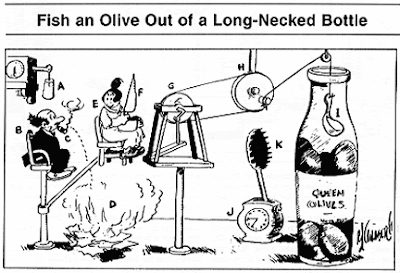Previously I wrote about business model disruption as one of the 3 common contexts for mobile initiatives Modus Create engages in. A second is transition from hardware-based (HW) business to software (SW) (which is often accompanied by business model disruption). Two years ago Mark Andreessen described this trend in a now famous Wall Street Journal article Why Software Is Eating The World, noting how Internet connected smartphones give every individual with such a phone instant access to the full power of the Internet, every moment of every day.
Now 5 years into the app era, much of the specialized hardware of the industrial and PC area seems antiquated and Rube Goldbergesque: car navigation systems, CD players, cable TV boxes, POS machines, home automation controllers, etc.

Auto navigation systems are a classic pivot case study playing out in front of our eyes. Garmin and TomTom created and dominated a hardware category, portable navigation devices, with systems that are a fraction of the cost of an OEM navigation system, with friendlier interfaces, easier update, and 3rd party application integration. Interestingly TomTom started as a software company and pivoted to sell hardware.
Back in 2007, days apart, Apple launched it’s first iPhone while Ford and Microsoft announced their Sync automotive platform collaboration. Now, seven years later almost to the day, comes the announcement of the Open Automotive Alliance, introducing Android based cars. With GM and Honda on board along with Google and a commitment to launching in cars this year, today might be the day when cars, the ultimate piece of mobile HW, begin to pivot to SW in earnest.
The commitment to 2014 launch is significant. Lacking urgency (and structured plans to drive decisions), pivoting hardware to software can be like boiling an ocean. And so for some firms it may not be achievable.
For others, it can not only be solved, but deliver a tremendous opportunity: for example Modus Create’s client EMN8 (now Tillster) provided self-service kiosks for restaurants including notable brands like Pizza Hut and KFC. By freeing themselves from the expensive on-premise HW, they have the opportunity to substantially improve the economics for their clients. By going mobile, they substantially increase the value they can add to their client’s customers and dramatically enhance the intimacy of that relationship benefitting everyone.
A few weeks back at Lean Startup Modus Create delivered a Turn the Battleship workshop going though our methodology to help create urgency and structure in planning new products. For those who missed it, download our free Product Kickstart Planning Guide and get your product moving in the right direction within just five days. We would love to hear your feedback so make sure you come back and leave us a note!
Jay Garcia
Related Posts
-
Lean: From Chevy Novas to Mobile Apps
Yesterday John Shook spoke about the origins of Lean and how GM, completely disrupted by…
-
Lean: From Chevy Novas to Mobile Apps
Yesterday John Shook spoke about the origins of Lean and how GM, completely disrupted by…
